The Intermediary Mortgage Lenders Association (IMLA) has warned that extending National Insurance (NI) contributions to landlords’ rental income would have severe consequences for smaller landlords, most of whom operate as individuals rather than limited companies.
The proposed measure, reportedly under consideration ahead of the November Budget, would disproportionately affect individuals who make up around 81% of the landlord market.
According to IMLA’s latest analysis, 58% of higher-rate taxpayers letting properties in their own name would face total tax and NI bills that exceed their entire rental profit – effectively paying more than 100% of their earnings back to the Treasury.
IMLA cautioned that the move would create a two-tier system between incorporated and non-incorporated landlords, further widening the gap between small-scale private landlords and larger, company-based property investors.
Many individual landlords have already been hit by a series of policy and regulatory changes in recent years, including the loss of mortgage interest relief, increased capital gains tax liabilities, the additional stamp duty surcharge and tighter compliance requirements.
The association argued that imposing NI on rental income could drive thousands more landlords out of the sector, exacerbating the ongoing contraction in private rental supply – which has already fallen by more than 110,000 properties since 2022.
A shrinking supply, it warned, would inevitably lead to further rent increases and greater affordability pressures for tenants.
IMLA’s report, The November Budget 2025: Surveying the Options, estimated that extending NI to landlords could raise approximately £2.2bn annually.
However, it concluded that the economic and social costs – including reduced rental availability, weakened investor confidence and higher rents – would outweigh the fiscal benefit.
Kate Davies, executive director of IMLA, said: “Extending National Insurance to landlords’ rental income may appear an easy way to raise money, but in practice it would hit exactly the wrong people.
“It would punish smaller, often part-time landlords who provide homes for more than four million UK households, while leaving larger incorporated operators untouched.
“That is both unfair and economically counterproductive.
“This would be a short-sighted and self-defeating move. Fewer rental homes mean higher rents, less mobility, and more pressure on public housing.
“At a time when the UK needs more investment in property, not less, this proposal risks driving it away.”



